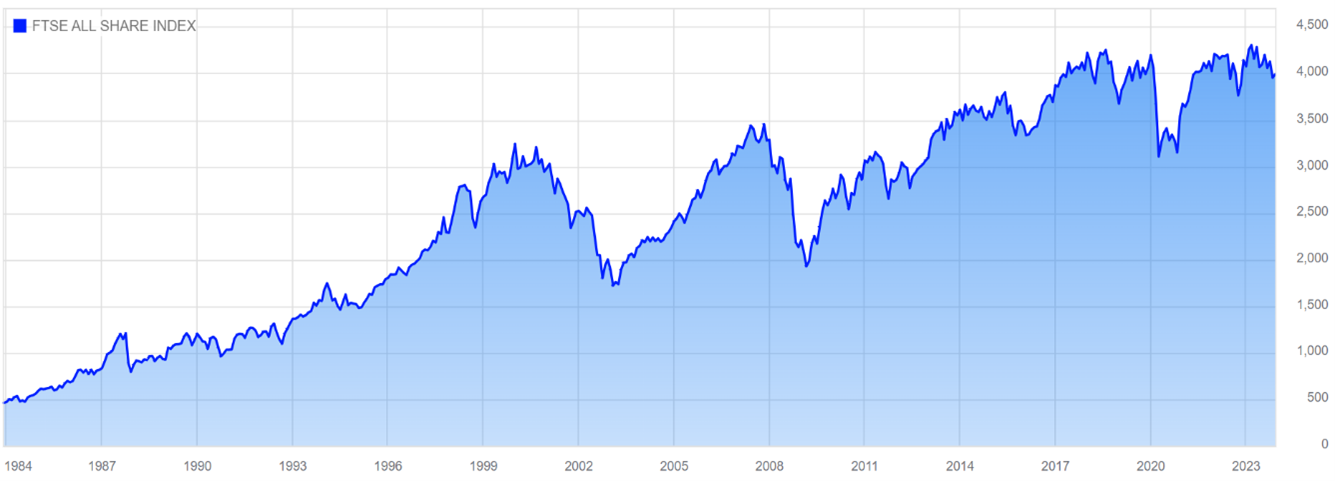It can be easy to think of market volatility as a relatively new phenomenon. The upheaval of the coronavirus pandemic led to the worst day for the FTSE 100 in more than 30 years. Since then the cost of living crisis, Russia’s invasion of Ukraine, and political turmoil at home have created economic uncertainty reflected in global markets.
But before Covid, there was Brexit, the 2008 financial crisis, the war in Iraq, the bursting of the dot-com bubble and (more than 30 years ago) Black Monday.
Market volatility, then, isn’t a new kid on the block. It can, though, still be worrying, especially for new or inexperienced investors.
At Murphy Wealth, we have more than 40 years of experience dealing with the ups and downs of financial markets, which means we’re in the best place to offer you advice and reassurance.
Here’s how we can help you cope with anxiety-inducing stock market blips.
- Ensuring your investments are long-term
When we help you to invest (whether through a single pension plan or an investment portfolio), we’ll ask you about your timescales and your attitude to risk. We’ll also be sure to understand your long-term goal.
Usually, this goal will need to be at least five, if not 10 years away. That’s why it’s called a long-term investment. And the reason your investments are long term is to allow them to ride out periods of short-term volatility.
At Murphy Wealth we know that daily movements and the occasional dip are not only to be expected, but they need to be accepted as an inherent part of the investment process.
- Understanding the general upward trend of the market
Now we know that market volatility will occur. We also know that the general trend of the stock markets is upward. This can be seen simply by looking at markets over the long term.
Here’s the FTSE All-Share Index over the last 40 years:

Source: London Stock Exchange
While the dips – the Iraq War in 2003, the global financial crisis of 2008, and the outbreak of the Covid pandemic in 2020, for example – are clear, so too is the upward trend.
Not only that but a closer look at the peaks and troughs hints at the reason for the trend. Generally, short-term shocks are quick but sharp, followed by longer, albeit slower, periods of recovery.
The importance of a long-term investment is also clear, helping you to bridge the gaps between rises.
- Helping you to ignore the noise and focus on your goals
With so much going on in the world right now, staying focused on your goals can be tough.
High inflation, a soaring cost of borrowing, and the will-we-wont-we talk of a UK recession could easily lead to constant worry and doom-scrolling.
But ignoring this background noise and focusing on your end game is key.
Knowing that you have a robust plan in place can help give you a sense of control.
It’s important to remember too that market downturns can represent opportunities. Not only might you buy valuable shares are lower prices, but by staying in the markets you’ll be ideally placed to see returns when the markets begin to recover.
- Diversifying your portfolio to spread risk
Stock markets rise and fall daily so it’s always best to avoid checking in too regularly.
Also remember that your investments are diversified across asset classes, sectors, and geographical regions. This is done to spread risk.
It means that a fall in one asset class or a certain part of the world may well be counteracted by a rise in another area or type of asset you hold.
This is the reason why a 5% fall in a given index or sector won’t automatically equate to a 5% drop in the value of your investment.
- Offering reassurance
We constantly monitor your investment to ensure that you remain on track to achieve your goals and that your asset allocation remains aligned with your risk profile.
If we decide – based on our decades of experience – that we need to make changes, we will. But remember, if your ultimate aim hasn’t changed, then your strategy doesn’t need to either.
Regardless of the global noise or market trends, we have your long-term plan as our focus. This means you can sit back and relax, confident that your money is in safe hands and that your goals remain attainable, whatever is happening in the wider markets.
Get in touch
Whether you’d like to invest for the first time, want help managing an existing portfolio, or just want reassurance that your plans remain on track, we can help. To discuss anything raised in the above article, or if you have questions about any aspect of your long-term finances, please email us at beyourself@murphywealth.co.uk or give us a call on 0141 221 5353.
Please note
The value of your investments (and any income from them) can go down as well as up and you may not get back the full amount you invested. Past performance is not a reliable indicator of future performance. Investments should be considered over the longer term and should fit in with your overall attitude to risk and financial circumstances.


 Production
Production